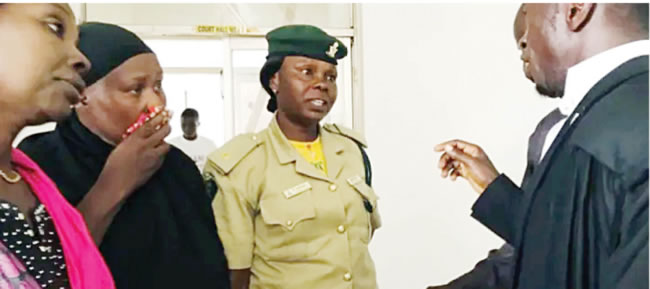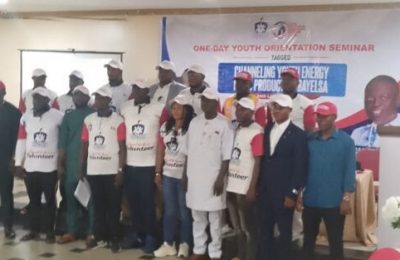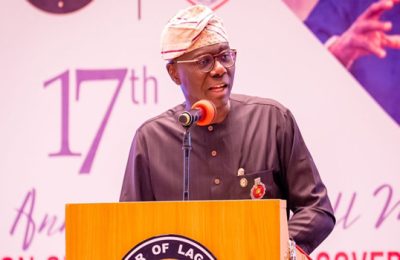
For sharing a message among her co-workers that criticised a mob action in May 2022, Rhoda Ya’u Jatau has spent the last year in police detention on charges of blasphemy towards Islam.
The healthcare administrator with the Warji Local Government Area of Bauchi State was arrested a few days after forwarding a video condemning the burning to death of Deborah Yakubu, a student of the College of Education, Sokoto, another state, over alleged blasphemy.

Prosecutors allege that by sharing the video, Jatau, then 45, committed multiple offences of inciting disturbance, contempt” for religious creed, and cyberstalking.
Two weeks ago, a Bauchi State high court rejected her “no-case submission.” Kola Alapinni, lead counsel at Abuja-based nonprofit Foundation for Religious Freedom, who is familiar with the case, told Al Jazeera that the defence team is expected to make a case when the court sits again in December.
If found guilty, Jatau, a mother of five and Christian, could be sentenced to a few years in prison, he said.
The court’s decision has sparked public outrage in parts of Nigeria, a country with a history of religious extremism.
“This really shows how far extremism has permeated deeply into our institutions. You will lock a person for just forwarding a message because you don’t think that it favours what you believe in? I don’t think that has any place in our society today,” said Ndi Kato, politician and executive director of Dinidari, an advocacy group for women’s rights in the Middle Belt, as central Nigeria is often referred to.
When contacted by Saturday Tribune, Rhoda’s husband, Ya’u Adamu, simply said: “It is my lawyer that will speak on the matter.” The lawyer was also contacted but he told our correspondent that he would speak on the matter at a later time.
However, some people in Katanga Warji who spoke on the condition of anonymity extolled Rhoda’s virtues and described her as a peaceful woman.
One of the respondents was a colleague of Jatau who called her a dedicated health worker with passion for ensuring that her clients got the best medical attention at all times. The colleague said embattled Jatau’s comment in the wake of the incident in Sokoto was an innocent one and so she was at a loss as to the reason her colleague had remained behind bars for this long.
Another person who spoke on the issue is a member of Jatau’s church. She described her as committed church worker.
In a reaction to the development, the Bauchi State chapter of the Christian Association of Nigeria (CAN) said it was doing everything to intervene and ensure amicable resolution of the issue. According to CAN, the involved Christian bodies, especially CAN, should be allowed to conclude their negotiations with the relevant parties in the state, as “elevating the situation could lead to confusion, so it’s essential to approach it with caution.”
Reacting to the development, a prominent human rights activist and Executive Director, Council for Affirmative Action, Mbami Sabka, called on civil society organisations across the country to unite for an observation of the court proceedings on December 19 in Bauchi State when the case of Jatau will be continued.
Sabka said the call for action stemmed from the detention of Jatau for 18 months, expressing concern over what he described as “delayed justice” and alleging that “selective treatment” was being meted out to Jatau.
He said: “She is charged with inciting public disturbance, contempt of religious creed, and cyber-stalking. Jatau’s prolonged detention has sparked public outcry, symbolised by the trending hashtag #FreeRhoda.”
The human rights activist emphasised the need for CSOs to unite against this “perceived violation of justice”, saying, “The call resonates with the broader public sentiment, as netizens on social media have condemned Jatau’s detention.”
He also called for a “collective condemnation of both the selective justice against Jatau and the delayed justice in Deborah’s case.”
The rights activist added: “The court observatory on December 19, 2023, is envisioned as a unified stand against these injustices,” and called on all concerned parties to join hands in ensuring a fair and impartial legal process.
Also reacting to the development, the Centre for Information Technology and Development (CITAD) urged the Federal Government to, as a matter of urgency, order the immediate and unconditional release of Jatau.
The Executive Director of CITAD, Yunusa Ya’u, made the call during a press conference on the digital rights implications of her continued detention by the Bauchi State government over her social media post.
Addressing the press at the CITAD office in Bauchi on Friday, Ya’u said: “You may all recall that on the 20th of May, 2022, Mrs Jatau was picked up at her residence by the NPF on the allegations of alleged incitement and inciting public disturbance. The police action was based on their perception of what her message could do.
“This action has directly infringed on her rights to freedom of expression and speech as enshrined in the 1999 Constitution of the Federal Republic of Nigeria as amended. Her post, while perhaps strong in its language, did not incite violence or hatred.
“It was simply an expression of her opinion, a right guaranteed to her by our constitution. It is an outright abuse of her digital right to freedom of expression online.
“However, immediately after sharing the post, she was arrested and taken into custody. Her bail was consistently denied, and she has been held behind bars ever since. This is not just an injustice to Rhoda; it is an attack on the digital rights of every citizen in this country.”
He added: “Denying someone bail based on a social media post sets a dangerous precedent for our collective freedom and democracy. It sends a bad signal that the government can silence any dissenting voice if they deem it contrary to their own opinion.
“And if this trend continues, it will make people to be afraid to speak their minds, express themselves and associate online for fear of being attacks, arrested or molested by the Nigerian government or its agencies as in the case of Rhoda’s and many others.
“It is crucial to remember that Sections 38 and 39 of the 1999 Federal Republic of Nigeria Constitution guarantee freedom of thought, conscience, religion, and expression.
“Additionally, the government of Nigeria is a signatory to various international human rights law instruments and treaties, including the African Charter and the International Covenant on Civil and Political Rights, which all hold the fundamental human rights of the citizens in Nigeria.
“Rhoda’s arrest and continued detention are a violation of her digital rights, and we cannot stand and do nothing while injustice is meted on one of us.
“As an organisation working on the protection of human and digital rights of Nigerians, we strongly condemn the unnecessary adjournments and postponements of Mrs Rhoda’s case hearing, which has been delayed five times since March 2023.
“We further denounce the rejection of her application for a ‘no-case submission’ by her lawyers despite having no criminal history.
“We call on the Federal Government to immediately intervene and ensure the release of Mrs Jatau without further delay and Bauchi State government to order the Attorney General in the state to facilitate the release of Mrs Jatau unconditionally.
“We also call on the Nigeria Police Force to desist from arresting the citizens for exercising their constitutional rights online. We call on the media organisations nationwide to amplify the voices of Mrs Jatau and others who face similar injustices at the hands of the Nigeria Police Force and other agencies.”
CITAD also appealed to human rights organisations, civil society organisations and lawyers to unite to assist victims of digital rights abuses and safeguard the digital rights of Nigerians.
The National Assembly was also called upon to speed up the passage of digital rights and freedom bill which CITAD said it believed will address most of the injustices perpetrated against the citizens under the guise of national security.
‘Highly restricted’
Al Jazeera, in a report on the case, noted that half of Nigerians are Muslims and a slightly smaller proportion – 45 percent – of their compatriots are Christians but Nigeria is officially a secular country whose constitution allows for freedom of speech and religious association. For decades, religious tensions have found their way into many facets of life in what is also an ethnically diverse country. This is most pronounced in northern Nigeria where many states have adopted variations of the conservative Islamic law since the country’s return to democracy in 1999.
Before and after the law, dissenting beliefs and opinions or actions deemed to be blasphemy have routinely sparked riots, mob action, or jail sentences in the region. Across the north, judgements critics of Islamic law consider harsh, including death by stoning, have been handed out repeatedly.
This has also been the case in Bauchi, one of Nigeria’s 36 states, which is wedged between the predominantly Christian Middle Belt and the mostly Muslim northeast. The state adopted Islamic law in 2001.
Nigeria is one of the 12 countries in the world that still criminalises blasphemy and one of the seven where it is punishable by death, according to Alapinni.
Isa Sanusi, country director for Amnesty International in Nigeria, told Al Jazeera that blasphemy or accusations of blasphemy are now a tool for gross human rights violations or even for “settling personal scores”.
“Repeatedly, Nigerian authorities failed to uphold and protect human rights by making sure that people are not either killed or attacked for expressing their opinions,” he told Al Jazeera.
Before and after the law, dissenting beliefs and opinions or actions deemed to be blasphemy have routinely sparked riots, mob action, or jail sentences in the region. Across the north, judgements critics of Islamic law consider harsh, including death by stoning, have been handed out repeatedly.
This has also been the case in Bauchi, one of Nigeria’s 36 states, which is wedged between the predominantly Christian Middle Belt and the mostly Muslim northeast. The state adopted Islamic law in 2001.
Nigeria is one of the 12 countries in the world that still criminalises blasphemy and one of the seven where it is punishable by death, according to Alapinni.
Isa Sanusi, country director for Amnesty International in Nigeria, said blasphemy or accusations of blasphemy are now a tool for gross human rights violations or even for “settling personal scores”.
“Repeatedly, Nigerian authorities failed to uphold and protect human rights by making sure that people are not either killed or attacked for expressing their opinions,” he told Al Jazeera.
Wakili Mathew Laslimbo, the general secretary of the Christian Association of Nigeria in Bauchi, said the minority Christian community in the state is unhappy about Jatau’s arrest. He told Al Jazeera that the association had tried everything possible to help, including trying to meet the state governor, to no avail.
“The arrest prove[s] to us that the freedom of speech and religion is highly restricted … the church continues to pray for her during gatherings,” her pastor Rev Ishaku Dano Ayuba told Al Jazeera.
The Bauchi state government did not respond to a request for comments. Temitope Ajayi, a presidential spokesperson, told Al Jazeera that the federal government had no knowledge of the case.
A pattern of extremism
There have also been other high-profile cases of blasphemy in recent years.
Mubarak Bala, an atheist and president of the Humanist Association of Nigeria who was arrested on the allegation of a blasphemous post on his Facebook account, has been in detention since 2020. Similarly, Yahaya Sharif-Aminu, a Sufi (Islamic) gospel artist, was sentenced to death on the charge of sharing blasphemous song lyrics on WhatsApp. The case is still in court.
Amnesty International has called for their immediate and unconditional release, as well as protection of their rights afterwards.
“Nigerian authorities must wake up to their national and international legal obligations to protect and promote human rights, including the right to freedom of religion,” Amnesty director Sanusi said.
In August, the United Nations special rapporteur on freedom of religion or belief released a statement on the issue.
“We express concern over the criminalisation of blasphemy in Nigeria contrary to international human rights law and standards and the rising episodes of violence relating to accusations of blasphemy targeting religious minorities in Nigeria,” it said.
According to Sanusi, the latest case underscores the need for justice through a fair trial of all people suspected of responsibility for mob violence to deter would-be perpetrators.
After Yakubu’s lynching in Sokoto, the arrested perpetrators were let off the hook due to the negligence of the prosecution who refused to show up at the court hearing. In contrast, since Jatau was arrested by the police, she has been denied bail and her family has been in hiding for fear of violence against them.
Jatau’s ongoing ordeal, Dindari’s Kato said, is part of a pattern that signals that women in the north and Nigeria as a country are not safe.
“A person who was complaining about this injustice is the person that is going to jail,” she said. “Extremism takes out women and it is just disheartening. This means that women are not safe and we need to speak.”
The Sultan of Sokoto, Alhaji Muhammad Sa’ad Abubakar, considered the leader of all Muslims in Nigeria, told new recruits in the one-year mandatory national youth service programme recently that Islamic law would not apply to non-Muslims among them.
Alapinni agrees, pointing out that the Court of Appeal had indeed ruled in two earlier cases that Islamic law is limited to Islamic personal law which includes succession, inheritance, and marriage.
“There is no room under the constitution for Sharia criminal law,” he said. “The sultan [of Sokoto] is right when he says the Sharia law is not supposed to affect non-Muslims. In fact, the Sharia criminal law should not have been promulgated in the first place … [it] has no place … in a country multicultural, diverse and multireligious like Nigeria,” he said.
READ ALSO FROM NIGERIAN TRIBUNE







